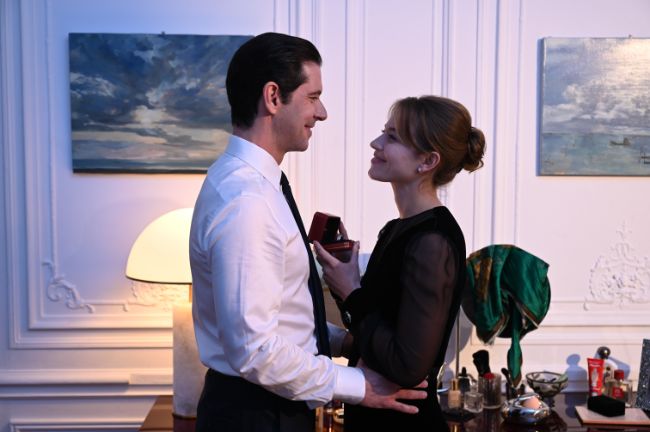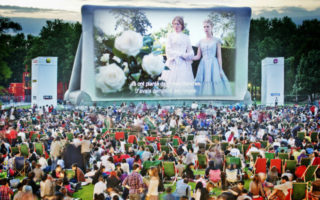Coup de Chance: Woody Allen à la Française
- SUBSCRIBE
- ALREADY SUBSCRIBED?
BECOME A BONJOUR PARIS MEMBER
Gain full access to our collection of over 5,000 articles and bring the City of Light into your life. Just 60 USD per year.
Find out why you should become a member here.
Sign in
Fill in your credentials below.
Conventional wisdom has it that Woody Allen’s personal controversies have made him so radioactive in the U.S. that he’s being hounded to Europe in order to continue working. Be that as it may, Allen has always had a special relationship with the French: his movies have always been warmly received in France, they make more money here than in the U.S., and to the French he’s an icon of New York and Jewish-American humor and intellect. In return he’s made complimentary remarks about France, and directed Midnight in Paris, a Valentine to the city (and one of the best movies of his “late” period). It was perhaps just a matter of time before he tried his hand at making a movie not just set in France, but a French movie, with French characters, a French story, and in French to boot.
The result is definitely worth seeing, an example of filmmaking at its most assured and immaculate, with a marvelous ensemble of actors and technicians, in particular the legendary cinematographer Vittorio Storaro (who’s worked not only with Allen but also Coppola and Bertolucci). Coup de Chance is in other ways an unwieldy mixed bag. It changes gears from extramarital drama to James Cain-ish noir to Agatha Christie procedural. The disparate pieces hold together but it’s a little jarring, and riddled with plausibility holes. Underneath it all we see the faint outlines of The Great Gatsby, that archetypal American story, transposed to a land where sinister remains of the aristocratic day can sometimes emerge, like an old boar that’s still very lethal.
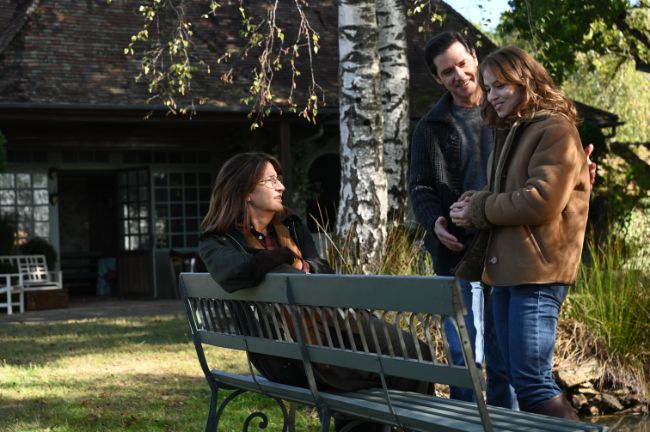
Still from “Coup de Chance.” Image credit: Metropolitan Filmexport
The story begins when a pair of youngish Parisians, one-time university friends, meet again after many years. The situation we’ve seen in other films isn’t the result of an on-line search, but a chance meeting on a Paris street — a central motif of the film is the irony of fate, or chance. He’s a somewhat boho writer, she works at the posh auction house ArtCurial. They begin meeting at lunchtime, until the newfound embers of friendship flare into full-scale romance. The stumbling block is Fanny’s husband Jean, a charming but hard-edged financier, one the lovers are able to maneuver around, until his wife’s behavior arouses suspicion.
Lou de Laâge (who acted in Réspire and Le Bal des Folles, directed by Mélanie Laurent, as well as giving a prize-winning turn in Les Innocentes) gives a strong performance as Fanny. She’s a sensual beauty, but also capable of expressing tectonic shifts of intense emotion. Niels Schneider as Alain is charming and romantic, but we don’t really believe in him as a writer. The gravitas (even when not quite authentic) of a French author is lacking. It’s a light, and er, expendable, role.
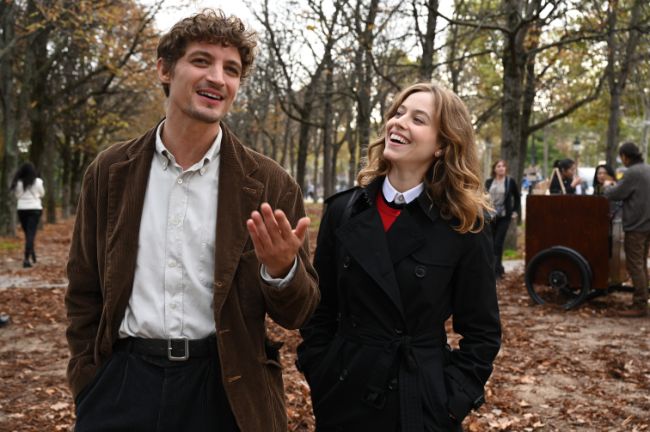
Still from “Coup de Chance.” Image credit: Metropolitan Filmexport
The film is dominated by the older characters, played by two formidable talents. Melvil Poupaud, a major actor (Polanski’s An Officer and a Spy and Arnaud Desplechin’s Frère et Soeur, among many others), is downright scary as Jean, even when his scenes are supposed to be innocuous. Someone compares him to Gatsby because of the mysterious origins of his fortune, but he seems more like the brutal and coarse Tom Buchanan character in Fitzgerald’s novel. Today self-made moguls have no romanticism, or the need to hide their iniquities — it’s all out there, shamelessly in the open. When he decides on a violent course of action, it isn’t with the torturous hand-wringing of Martin Landau in Crimes and Misdemeanours, but with a determination that’s both seething and cold-blooded. We feel that Poupaud wants to find some ambiguity in the role, but it simply hasn’t been written that way by Allen.
The other dominant personage is Valerie Lemercier as Fanny’s mother Camille. Lemercier is mainly a comic actress, but here gives a fantastic performance as a somewhat ordinary woman with surprising reserves of observation power, intuition, and determination to rival her son-in-law’s. When she smells a rat in Jean, suspecting that he’s up to no good regarding his marital difficulties, Camille turns into a Miss Marple or Angela Lansbury in Murder She Wrote. Though her role (like the rest of the film) is devoid of humor, Ms. Lemercier’s comic sensibility still manages to give the character a light fizz. It’s strange that Allen didn’t let her rip — it would have turned a somber movie into much more.

Still from “Coup de Chance.” Image credit: Metropolitan Filmexport
The revelation of Coup de Chance, at least technically, is rediscovering the camerawork of the great Storaro. He bathes the film in an autumnal lambent tint that makes us feel on our senses both passion and human limitation, whether moral or physical. The camera moves in a sensuously fluid way, often in relative close-up. What’s missing is the comic objectivity that comes when the camera pulls away, as in Allen’s comedies, to show characters colliding with each other or with material reality. Also, while aesthetically pleasing, the lighting and even the jazz score never change with the narrative swerves and characters’ fates, and finally become wearying.
The director’s efforts to be authentically French, or at least Parisian, also have mixed results. Like many non-French filmmakers shooting in Paris, every setting seems like gentrified rue des Martyrs — there’s never any grottiness. Apartments and country homes are out of upscale glossy magazines, and even the writer’s supposed garret seems luxurious. And yet Allen’s portrait of a certain rarefied social milieu, old landed bourgeoisie glommed onto new finance loot, is on target.
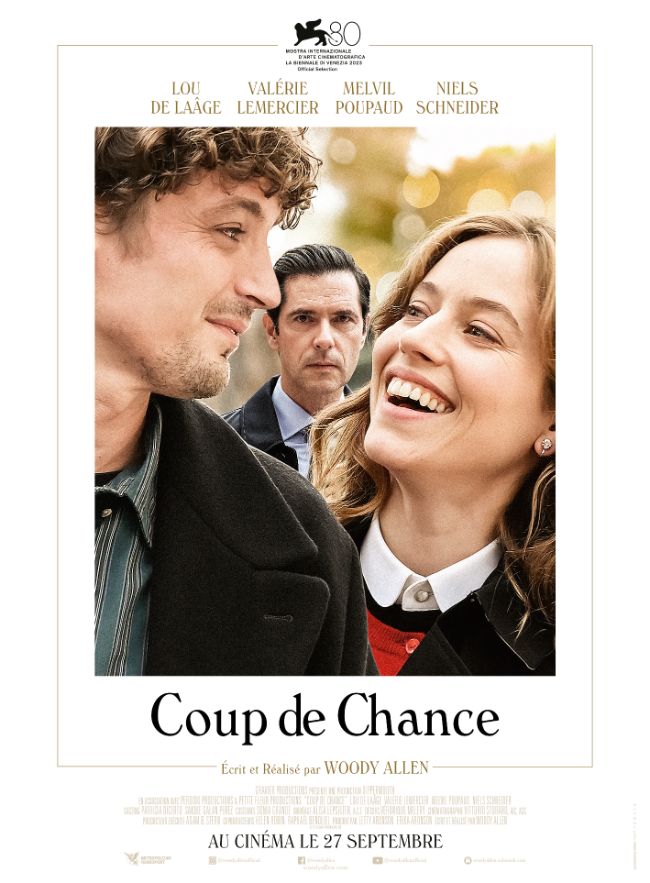
Allen makes a lot about the irony of chance. The two old friends find each other by chance, and the climax is impacted by hazard as well, yet the effect is heavy — the film doesn’t have layers of irony or an ironic tone. In the end, the director doesn’t really give us a believable vision of modern life, as in his greatest works. With this film, Allen is an expert (if grim) craftsman and entertainer. The constant lambent glow, imperturbable jazz music, controlled twists of plot and brilliant acting all give Coup de Chance the flavor of a rich cinematic bonbon, something to savor but not to be too moved by.
Production: Gravier Productions
Distribution: Metropolitan Filmexport
Lead photo credit : Still from 'Coup de Chance'
More in cinema, Coup de Chance, Dimitri Keramitas, film, film review, Woody Allen
